#408 Grizzly twins and latter-day saints
October 27th, 2018

Gracie
by Joan MacLeod
Vancouver: Talonbooks, 2018
$16.95 / 9781772012026
*
Thanks for Giving
by Kevin Loring
Vancouver: Talonbooks 2018.
$19.95 / 9781772012187
Both books reviewed by Ginny Ratsoy
*
Editor’s note: Ginny Ratsoy reviews the latest work of two of B.C.’s top playwrights, Joan MacLeod (born 1954) and Kevin Loring (born 1974). MacLeod teaches at the University of Victoria while Loring, previously Artist in Residence at the Vancouver Playhouse Theatre, is now Artistic Director of Indigenous Theatre at the National Arts Centre in Ottawa.
The past permeates both plays. “Both are firmly set in rural British Columbia and hard hitting in their approach to contemporary social issues,” says Ratsoy. Gracie is the story of a girl trapped in the “stifling, inbred, and self-segregating atmosphere” of a fundamentalist and polygamous Mormon colony in eastern B.C.
Thanks for Giving unpacks the issues that arise when three generations of a N’lakapamux family meet in their home village (based on Lytton, Loring’s hometown) for Thanksgiving dinner. The cast of eight includes the family matriarch, her non-Indigenous husband who has shot a grizzly bear for profit, their son who imports urban garbage from Vancouver by truck, and an articulate granddaughter who is also an environmentalist, academic, Indigenous rights activist, lesbian, and vegetarian. No wonder, as Ratsoy puts it, that “truths are laid bare” at this festive dinner –Ed.
*
While Joan MacLeod’s realist play, Gracie, is presented by a single actor assuming fifteen roles, Kevin Loring’s realist/expressionistic work, Thanks for Giving, features a cast of eight. However, their territories overlap in important ways: both are firmly set in rural British Columbia and hard hitting in their approach to contemporary social issues. Both reward the reader with a taken aback experience — a treasure that ensues from first-rate fiction that is at once true-to-life and in a world apart.
In 2001 I noted, concerning Joan MacLeod’s Hope Slide, that she “domesticates social issues.”[1] She favours private, rather than public, spaces, intensely develops a single character (most of her works are one-handers) and, through that prism, sheds light on issues ranging from eating disorders to bullying, from urban devastation to mistreatment of people with intellectual challenges. With Gracie, MacLeod successfully continues her modus operandi: the titular character moves with her family from a Fundamentalist Church of Jesus Christ of the Latter-Day Saints (FLDS) colony in the U.S. to its equivalent in B.C. Apparently, the tenets and practices of Mormon fundamentalist groups can vary; however, Gracie’s sect is dominated by leaders who practice polygamy and decide to whom the female members can be “assigned.”
We are privy to Gracie’s life from ages 8 to 15. The intimacy of the solo performance is well suited to the subject matter. MacLeod poignantly conveys the sheer obliviousness of a child who has known no other world than one where children raise children, material possessions are in short supply, virtually every subject in the school curriculum is thinly disguised religion, where one is evasive with the few members of the outside world one encounters, and where membership involves surrendering any semblance of freedom – particularly, but not exclusively, for women. This is a stifling, inbred, and self-segregating atmosphere.
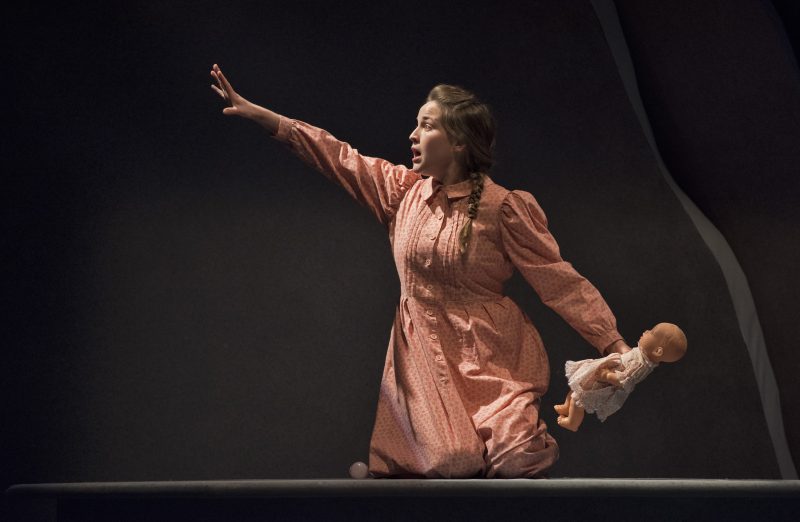
Lily Beaudoin as Gracie in premier at Belfry Theatre, Victoria, February 2017. Photo by David Cooper
Among the other characters we meet are Gracie’s mother, siblings, and friends, as well as authority figures such as Mr. Shelby, with whom the church has placed Gracie’s mother, necessitating the family’s uprooting. The extent to which Gracie’s mother’s individuality has been subsumed in the sect is particularly stunning: she is resigned to counselling her offspring to erase their pasts and lie about their present, and, even more harrowingly, to subjecting her daughters to virtual enslavement.
Lest we assume the patriarchal nature of the FLDS assures privilege to all male members, MacLeod introduces the hierarchy-within-the-patriarchy through Gracie’s older brother Billy. Unable to resign himself to finishing school after Grade Ten, performing low paid labour in the colony, and passively awaiting his rewards in the afterlife, he rebels, countering his mother’s attempts to erase the family’s past and catalyzing Gracie’s gradual awakening. After being banished from the sect and disowned by his mother, Billy secretly returns, to school Gracie in the realities of the colony and the larger world.

L-R: Joan MacLeod, Lili Beaudoin, and Vanessa Porteous on set of Gracie at the Belfry Theatre, Victoria, 2017. Photo by Darren Stone
Here again, MacLeod uses the solo performance to great effect. As Gracie mulls over Billy’s insights into the human commodification that is the backbone of the cult’s organization, and as she watches her female siblings and friends being assigned to males at the top of the hierarchy, she slowly confronts her own future. When things come to a head when she is assigned to an older man, she attempts escape. As her mother rushes from her stove to restrain her, she burns Gracie with hot cider.
Awakening in a public hospital, Gracie is soon visited by Billy, who reveals that their mother has disowned her, but given Billy written permission to return her to their biological father in the U.S. At times during their trip, Gracie is tempted to return to the B.C. colony; only through Billy’s diligence and insistence on recounting details of their early childhood does she gain the strength to continue the journey to their childhood home. Stories of her early history are her path to her future in the larger world.
*
The past also permeates Loring’s play, Thanks for Giving. As with his first play, the Governor-General’s Award-winning Where the Blood Mixes, Loring’s Thanks for Giving showcases an ability to blend realism and expressionism, gripping drama and laugh-out-loud humour, and traditional and contemporary cultures. He is a master at infusing N’lakapamux beliefs into a contemporary story of multi-generational family dysfunction.

Kevin Loring. Since June 2017, Loring has been Artistic Director of Indigenous Theatre at the National Arts Centre, Ottawa. Photo (2017) by Janet Smith
The play begins with matriarch Nan narrating a story about the Bear Dancer’s role as a guide to early humans, accompanied by the Bear Dancer herself. Nan’s culture links twin births to grizzles, and her family is replete with twins. When, unbeknownst to her, Nan’s Caucasian husband Clifford shoots a grizzly (ostensibly in self-defence, but, actually, we later learn, for profit) and her cubs, “the echo reverberates across the mountain valley” and into their home.
L-R: Aaron Wells, Tom McBeath, Deneh’Cho Thompson, Leslie Dos Remedies-Tai, Amy Grumman, and Margo Kane in Thanks for Giving at Arts Club Theatre, Vancouver, 2017. Photo by Emily Cooper
As three generations meet in their home village for Thanksgiving dinner, truths are laid bare. Nan’s unreliable daughter Sue has addiction issues — the result of her witnessing the accidental deaths of her husband and twin brother in the same accident and the sexual abuse she suffered at the hands of Clifford, her stepfather. Sue’s daughter Marie, whose generation was raised by Nan, is a not-quite-out-of-the closet lesbian, as well as a vegetarian, environmentalist, academic, and Indigenous rights activist who returns from the city with her female partner (“friend”) Sam. Marie’s twin, John, also returns from the city with the secret that he has left university intent on joining the military. Sam and John’s cousin Clayton, whose father was the accident victim, has stayed in the town, where he imports garbage from the city for a living and was Clifford’s accomplice in the bear shootings.
The inevitable collisions within such a fraught and divergent group of people are made all the more tense by their humour. Moving from widely varying accounts of the origins of Thanksgiving to more personal matters, the conversation becomes increasingly rancorous, culminating in disclosure of Sue’s addiction and Marie’s sexuality, which were not a complete surprise to the rest of the family, and the revelations of John’s career move and Clifford and Clayton’s desecration of the bears, which were.
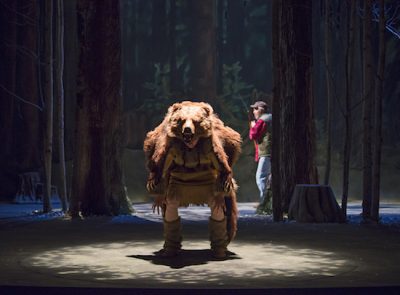
Shyama Priya and Tom McBeath in Thanks for Giving, Arts Club Theatre, Vancouver, 2017. Photo by Emily Cooper
Post dinner, as the characters share past experiences, tensions ease up slightly. Nan and Sue accept Sam, and Marie’s sexual orientation, and Clifford even shares a traumatic childhood experience of his own — when his father shot his beloved dog. However, some frictions, such as that between John and Marie, who cannot abide the thought of her brother risking his life for their colonizers, are not easily allayed. Above all, to Nan, the bear shooting is unforgivable. The present trauma precipitates a series of revelations by Nan: she divulges that she is a residential school survivor and recounts a story she has long repressed about a Chief’s daughter and a grizzly (transformed into human form) who parented twins, who could themselves transform into bears. Thus, her husband and grandson have committed an abomination against her family’s culture. Act One ends with expressionistic encounters between various characters and the Bear Dancer.
The style of brief Act Two is expressionistic as, a few years later, the characters confront the consequences of their actions in juxtaposed vignettes. John recounts the horrors of combat. Marie defends her thesis that violence against women and violence against the natural world are connected. Sue, in recovery, summons up the repressed memory of abuse and confronts Clifford. Conservation Officers confront Clayton, and Nan lies in court to protect her husband, but does not forgive him. This act ends with Clifford encountering the Bear Dancer and committing suicide.
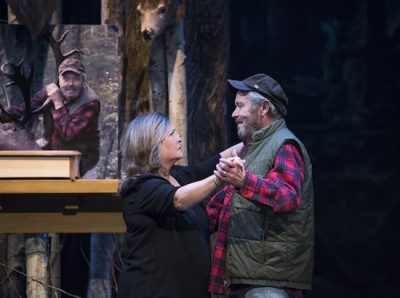
Margo Kane and Tom McBeath in Thanks for Giving, Arts Club Theatre, Vancouver, 2017. Photo by Emily Cooper
Although Clifford abdicated responsibility, his funeral, opening Act Three, occasions a reunion that catalyzes recognition in remaining family members, often through encountering his ghost. Clayton, still facing legal consequences for his role as accomplice, resents John for leaving him to care for Nan and Sue. The cousins come to blows, but quickly reconcile. John faces his combat trauma by remembering his first kill, a deer when he was twelve, under Clifford’s direction. Sue forgives Clifford’s ghost the verbal, physical, and sexual abuse. Marie and John make peace when she shares a digitized wax cylinder recording of their great-great-grandmother singing a Bear Song for twins, “a song given to our family by the Grizzly Bear … our song.”
Nan, after earlier retreating in despair for her future, reappears, and is soon buoyed by Sue’s recovery and assumption of the matriarchal leadership mantle, symbolized by the song she sings to Nan. Marie, who has earlier revealed that she is pregnant, announces that her water has broken. The play ends with newborn twins secure in their ancestors’ arms and, in a separate scene, the Bear Dancer, unmasked as Nan’s ancestor, leading Nan in a dance in celebration of the births.
Thanks for Giving, a compelling unveiling of intergenerational trauma, interdependence, and human hardiness, is a profoundly important addition to the growing body of Indigenous drama in Canada.
*
Ginny Ratsoy is an Associate Professor of English at Thompson Rivers University specializing in Canadian literature. Recent courses have included Modern Canadian Drama and The Environment in Canadian Literature. Among her publications are Playing the Pacific Province (co-edited with James Hoffman) and Theatre in British Columbia. Her latest academic publication is about a wonderful third-age learning organization, The Kamloops Adult Learners Society, and is published in No Straight Lines: Local Leadership and the Path from Government to Government in Small Cities, edited by Terry Kading (University of Calgary Press, 2018).
*
The Ormsby Review. More Books. More Reviews. More Often.
Editor/Designer/Writer: Richard Mackie
Publisher/Writer: Alan Twigg
The Ormsby Review is a journal service for serious coverage of B.C. books and authors, hosted by Simon Fraser University. The Advisory Board consists of Jean Barman, Robin Fisher, Cole Harris, Wade Davis, Hugh Johnston, Patricia Roy, David Stouck, and Graeme Wynn. Scholarly Patron: SFU Graduate Liberal Studies. Honorary Patron: Yosef Wosk. As of September, 2018, Provincial Government Patron: Creative BC
“Only connect.” – E.M. Forster
[1] Ginny Ratsoy and James Hoffman (editors), Playing the Pacific Province: An Anthology of British Columbia Plays, 1967-2000 (Playwrights Canada Press, 2001).

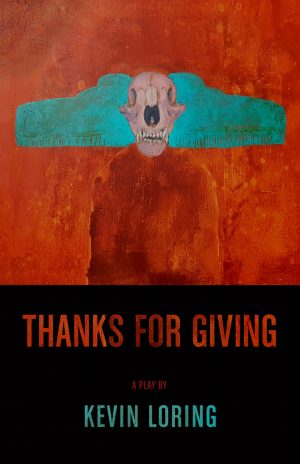
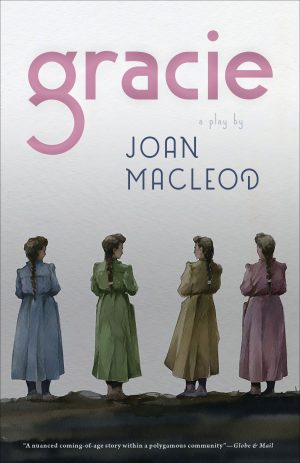
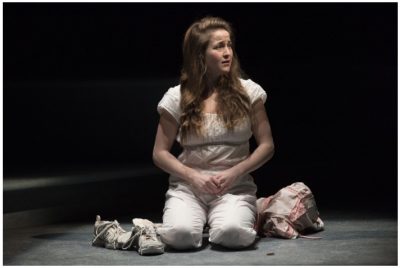



Leave a Reply